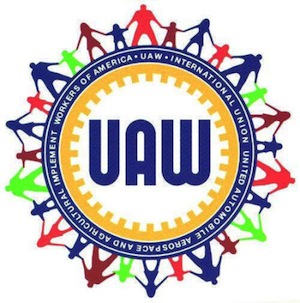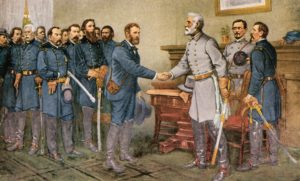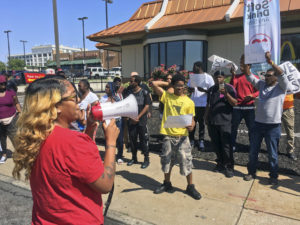With Auto Industry Recovery, UAW Comes Fighting Back
The United Auto Workers union has mounted significant efforts to do what seems the impossible: Organize two foreign-owned auto plants in the Deep South, the cradle of the nation's right-to-work movement. Their success could mean a rebirth for a major player in organized labor.
Just a few months ago, the United Auto Workers union seemed to be facing a mortal challenge when the Republican-dominated Michigan legislature added the heart of American industrial unionism to the list of “right to work” states.
But two recent reports in the New York Times suggest a renewed organizing vigor by the union as the auto industry continues to bounce back from its own near-death experience during the Great Recession. And it could just bring German-style worker-management relationships to the Deep South — where right-to-work laws have long posed significant challenges to union organizing.
The focal points are two factories operated by foreign car companies, a Volkswagen plant in Chattanooga, Tenn., and a Nissan plant in Canton, Miss. From the Times:
The senior labor representative at Volkswagen in Germany, Bernd Osterloh, is planning a trip to the United States to suggest a compromise in what has become a heated battle over the U.A.W.’s relentless drive to organize a foreign-owned auto plant in the American South.
He is expected to push for a German-style works council in the plant — a committee of hourly and salaried employees that gives labor a voice at the management table.
A works council is not like an American union, which can negotiate contracts and authorize strikes. But it does have the advantage of being a familiar form of labor relations for a German car company like VW.
The larger question is whether a works council can satisfy employees and politicians in Tennessee — and give the U.A.W. a foothold in the growing Southern auto industry.
But to create such a works council would likely require union recognition first, or else face legal challenges that VW created the committee as a company union, barred under federal labor law. So if VW wants its works council — which the UAW has said it is open to — then it likely will first have to recognize the union, which would be a major organizing victory.
At the same time, the UAW is globalizing its fight for union recognition at the Mississippi Nissan plant by sending activists to Brazil, South Africa, Tokyo and Paris — key places in Nissan’s world operations — to press the case, including disseminating a new independent report that “Nissan’s managers have illegally threatened to close the Mississippi plant if workers vote to unionize,” the Times says. According to the paper:
These efforts are largely directed at Nissan’s part-Brazilian, part-French chief executive, Carlos Ghosn, a renowned cost cutter who has said the company prefers communicating with its Mississippi workers without a union.
Closer to home, the actor Danny Glover has embraced the U.A.W.’s cause, speaking at colleges across the South to recruit students to distribute union fliers at Nissan dealerships. The union has also helped create a group of students and community and religious leaders, the Mississippi Alliance for Fairness at Nissan, which includes the N.A.A.C.P. The alliance often uses the slogan, “Labor Rights Are Civil Rights.”
At a time when the UAW has fewer than one-third of the 1.5 million workers it had in 1979, its organizing push in the South has taken on urgency and is being watched closely by labor leaders across the country.
“It’s a life-and-death matter for the U.A.W. to succeed in the South,” said Nelson Lichtenstein, a professor and labor historian at the University of California, Santa Barbara. “That’s why they’ve put their best organizers into this campaign.”
—Posted by Scott Martelle
.
Your support matters…Independent journalism is under threat and overshadowed by heavily funded mainstream media.
You can help level the playing field. Become a member.
Your tax-deductible contribution keeps us digging beneath the headlines to give you thought-provoking, investigative reporting and analysis that unearths what's really happening- without compromise.
Give today to support our courageous, independent journalists.




You need to be a supporter to comment.
There are currently no responses to this article.
Be the first to respond.